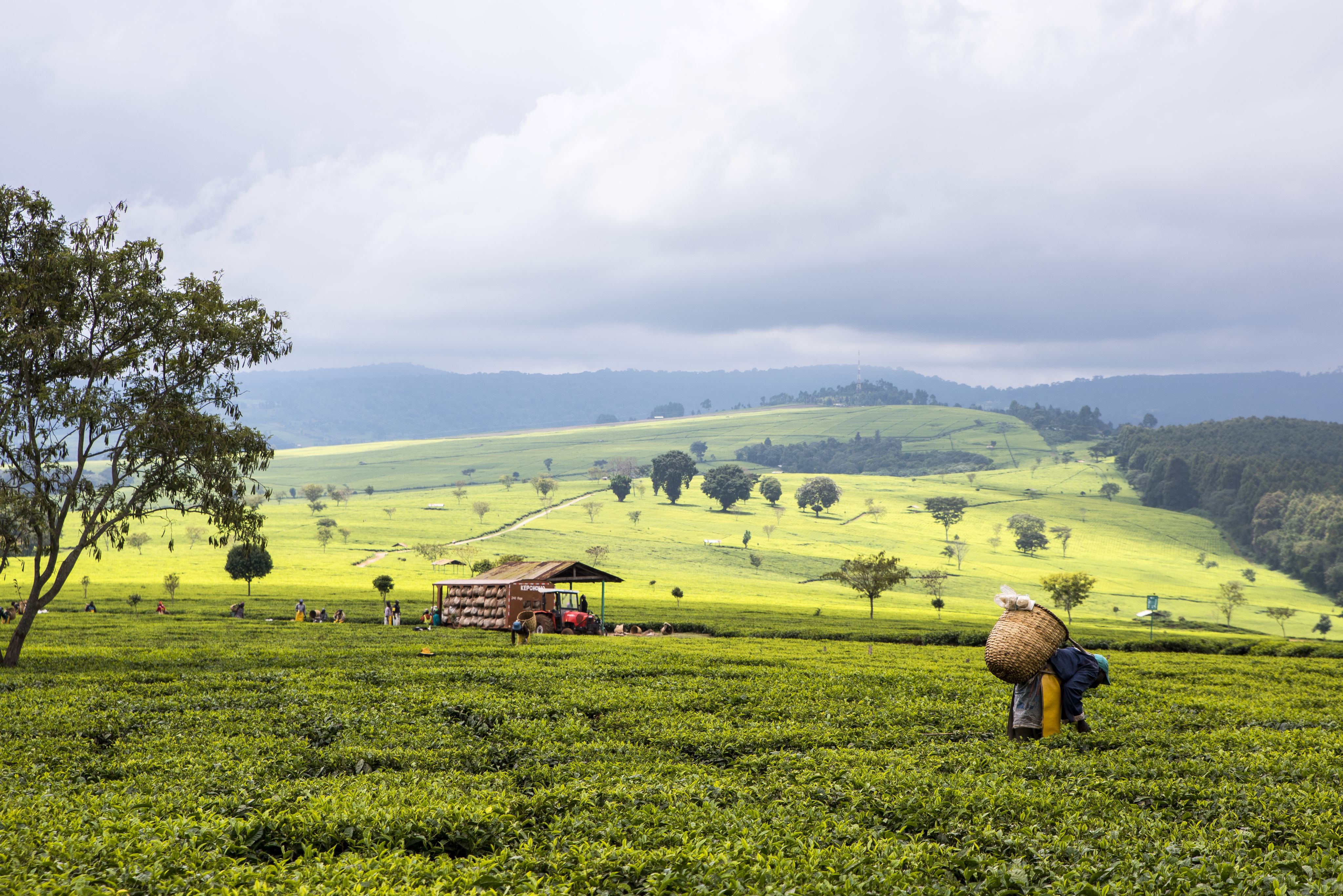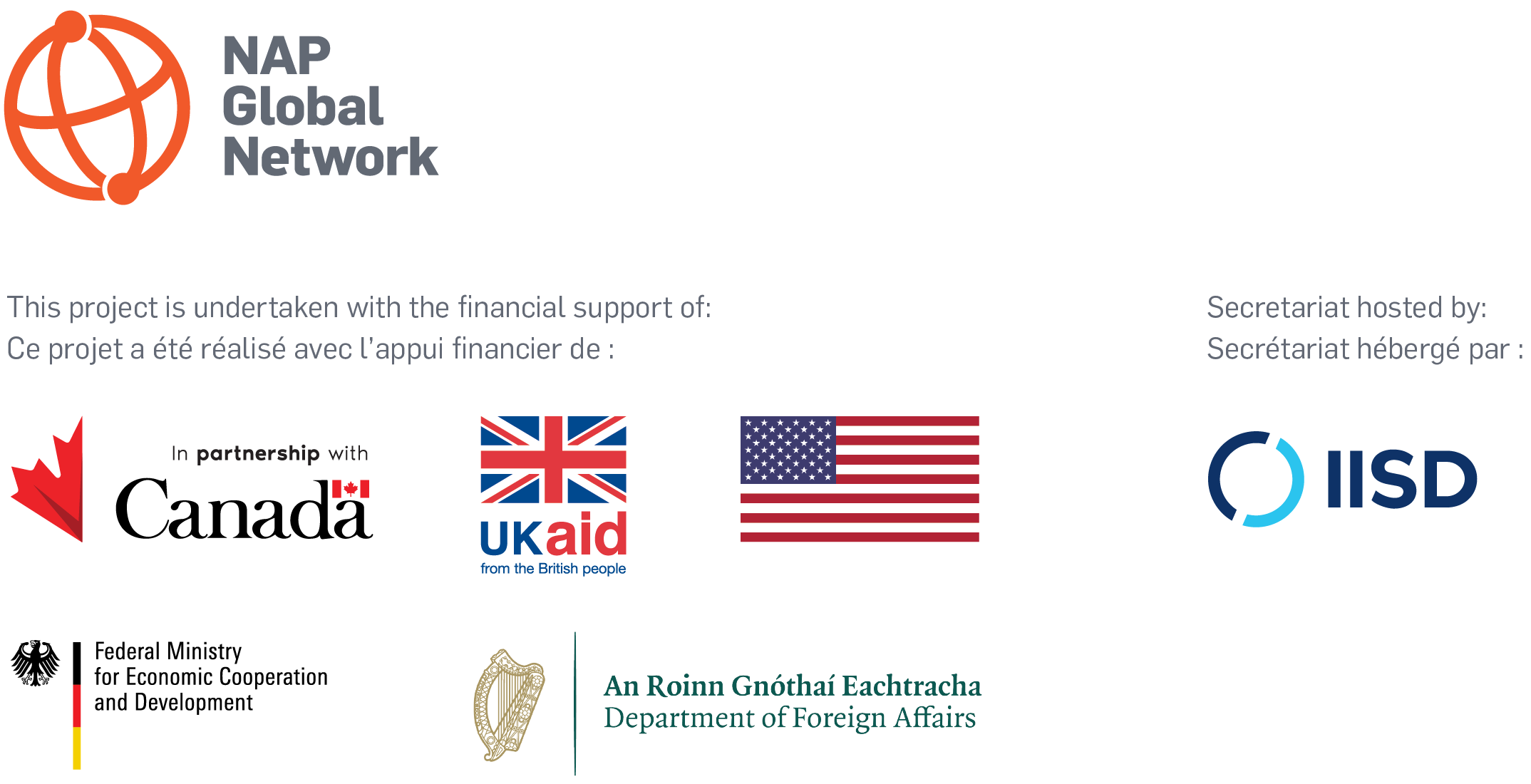A Great Year for
National Adaptation Planning
and the Network to Watch in 2022
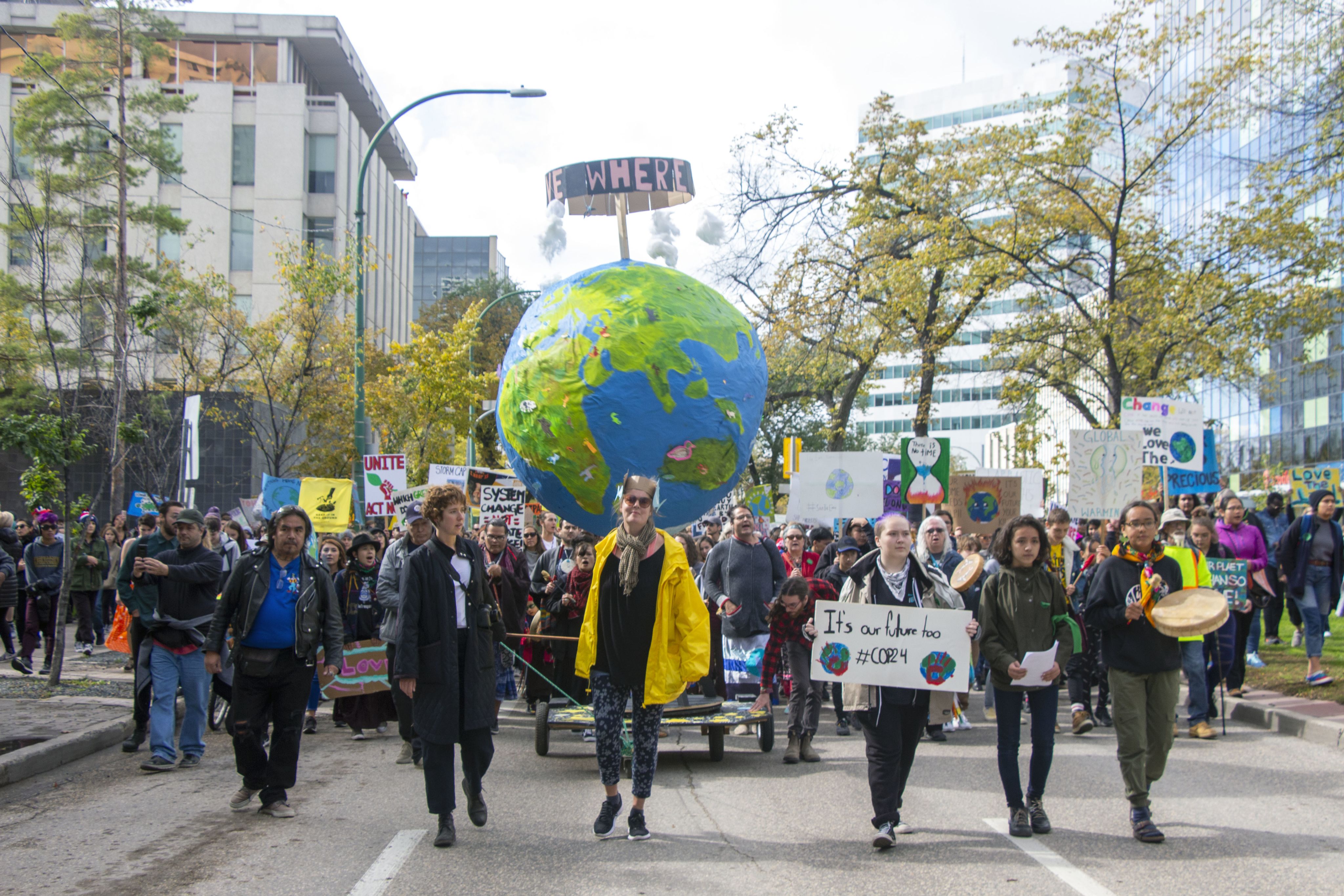
A new sense of urgency for climate action is being felt all around the world. We spent the year watching climate disasters cause heartbreaking scenes of destruction, all the while continuing to deal with the global COVID-19 pandemic. Other impacts of climate change—like rising sea levels, intensifying droughts, and irregular rainfall patterns—are harder to see and not as prominent in the media, but they are increasingly putting communities and ecosystems at risk as well.
These stories and images were backed by the latest science this year. In August, the Intergovernmental Panel on Climate Change (IPCC) report confirmed that some climate impacts are inevitable and irreversible. It raised alarm bells and confirmed that we cannot afford to delay our efforts to prepare for and protect ourselves against what’s to come. This means accelerating national efforts to put adaptation at the heart of decision making, which is exactly our goal here at the NAP Global Network.
The National Adaptation Plan (NAP) is a critical tool in the fight against climate change, using research and on-the-ground analyses to plan for adaptation efforts that will generate the most sustainable, just, and cost-effective solutions.
The NAP Global Network supports developing countries throughout the NAP process to accelerate the implementation of adaptation actions around the world. While reflecting on this year’s progress in our work, it's clear that the momentum being built for climate action will continue into the new year and NAPs will have a big role to play.
- Anne Hammill, Senior Director, Resilience, International Institute for Sustainable Development, NAP Global Network’s Secretariat.
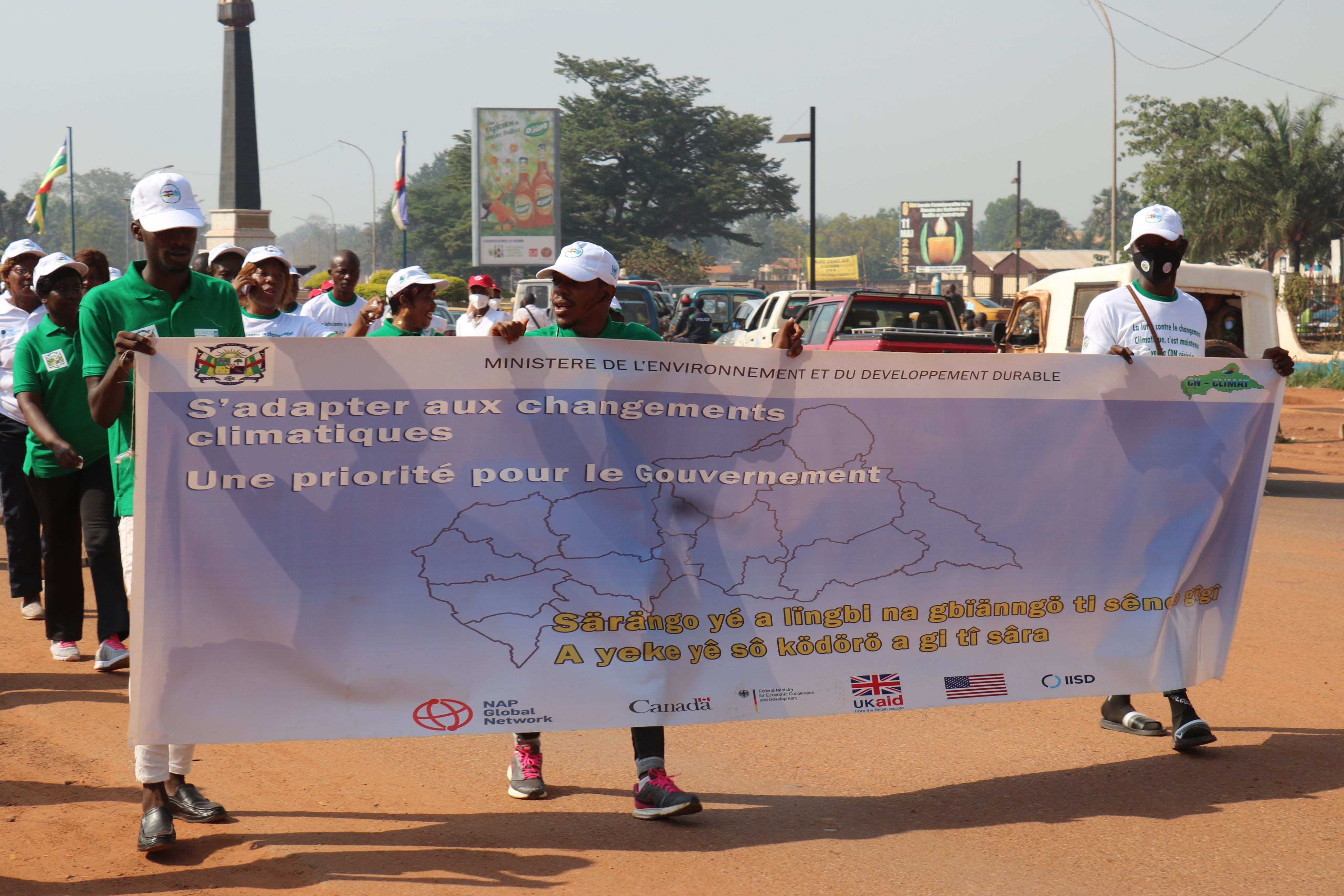
“Great March for Climate”. Credit: Madame Alexia Alima Sangey Guimando, Communication Officer, UNDP.
“Great March for Climate”. Credit: Madame Alexia Alima Sangey Guimando, Communication Officer, UNDP.
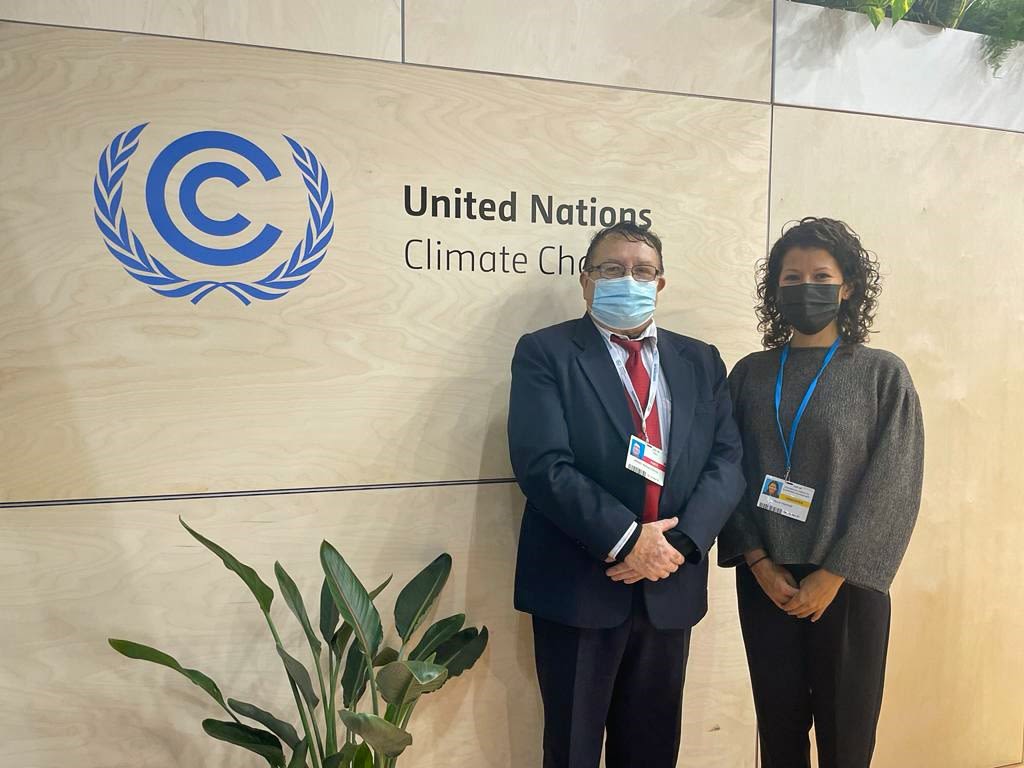
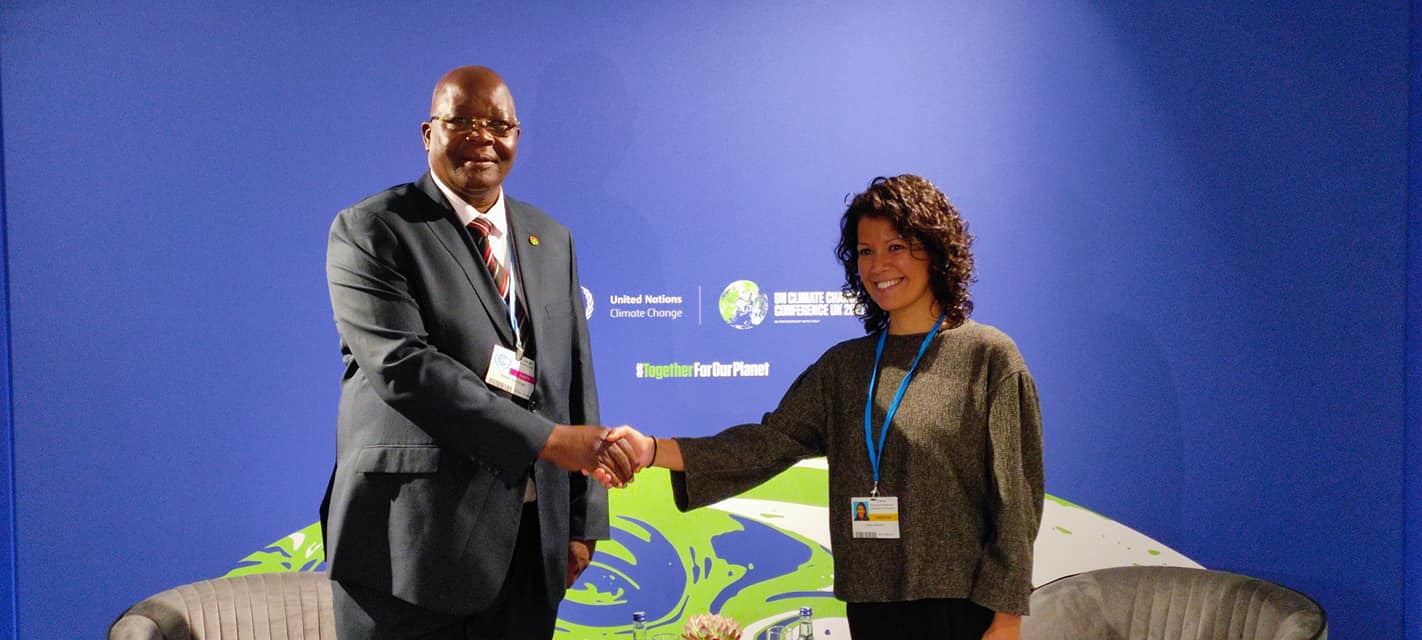

Hammill met with the Deputy Minister of Peru’s Ministry of Environment (MINAM), Alfredo Mamani, at the 2021 UN Climate Change Conference (COP 26) to announce a new collaboration project that will assist Peru in running a monitoring and evaluation system to track their NAP progress.
Hammill met with the Deputy Minister of Peru’s Ministry of Environment (MINAM), Alfredo Mamani, at the 2021 UN Climate Change Conference (COP 26) to announce a new collaboration project that will assist Peru in running a monitoring and evaluation system to track their NAP progress.

Hammill and Minister of Environment, Green Economy, and Climate Change of Burkina Faso, Siméon Sawadogo, discussed how the NAP Global Network can continue supporting Burkina Faso’s NAP process at COP 26. Photo from Siméon Sawadogo's Facebook.
Hammill and Minister of Environment, Green Economy, and Climate Change of Burkina Faso, Siméon Sawadogo, discussed how the NAP Global Network can continue supporting Burkina Faso’s NAP process at COP 26. Photo from Siméon Sawadogo's Facebook.
10 Countries Submitted Their National Adaptation Plans in 2021

Despite contributing the least to climate change, developing countries suffer the most from its impacts. These countries' governments witness first-hand the importance of developing an effective NAP that identifies different risks and priority actions for addressing them.
"I hope that this plan will be a cornerstone in the policy framework of reducing the risks of climate change and increasing the resilience towards it, continuously, for the benefit of present and future generations,"
said Sheikh Abdullah Ahmad AlHumoud AlSabah, Chairman of the Board and Director General of Environmental Public Authority (EPA), in the foreword of Kuwait's NAP—the development of which was led by the EPA.
For example, Albania has made progress on preparing for climate change impacts through its NAP process, including by implementing priority activities with a focus on gender equity and ecosystem-based adaptation.
National Adaptation Plan of Albania.
In the last year, 10 countries submitted their NAP documents to the United Nations Framework Convention on Climate Change (UNFCCC), including six countries we’ve worked with on technical assistance and peer learning. As more and more countries submit their NAPs, we expect governments to increasingly focus their support requests on how to implement these plans.
“The support we provided for South Africa’s adaptation cost estimates and their resource mobilization strategy, or Peru’s efforts to ensure a participatory NAP development process, are important pieces of their transition from planning to implementation,”
This substantial number of submitted NAP documents is an exciting achievement, as it doubles the previous record amount of NAPs filed in a single year (in 2019, five NAPs were submitted to the UNFCCC). Between our country partners and other nations working on their adaptation plans, we can expect more submissions to follow in 2022.
More Technical Support Requests for Adaptation Than Ever Before

In 2021, the NAP Global Network received 47 requests for short-term technical assistance—more than all previous years combined! These requests are sent through the Country Support Hub. Our Secretariat’s researchers and policy advisors have worked with 45 countries since the Hub’s launch in 2016.
Contributing to several of these requests, the NAP Global Network established collaborations with 20 countries in preparing their first Adaptation Communication (ADCOM) to the UNFCCC after sending out an open call for requests in May. By compiling and analyzing information on adaptation progress, priority actions, and support needs, a country’s ADCOM is as an important resource for elevating the profile of adaptation, as well as for the global stocktake under the UNFCCC.
Learn how a country's Adaptation Communications (#ADCOMs) will be used to show progress and identify where support is needed.
With funding from Germany and the United Kingdom, our Secretariat team worked closely with these national governments and found that—to avoid doubling any work—most of them chose to leverage their NAP process strategically to develop their ADCOM, regardless of where they were in the process. These efforts will continue in 2022, and we expect a surge of ADCOM submissions to take place before the call for inputs into the global stocktake closes.
Other results from our technical support requests of 2021 included:
- Burkina Faso’s first NAP progress report, which identifies lessons learned and recommendations for future actions, and assesses results from adaptation efforts in each sector.
- A national gender advisor assisting the government of Côte d’Ivoire in mainstreaming gender considerations into climate action.
- A new analysis led by the government of the Republic of the Marshall Islands that explores opportunities and challenges in integrating gender equality and human rights objectives in the NAP process.
At COP26, Siméon Sawadogo, Minister of Environment, Green Economy, and Climate Change, Burkina Faso, shared the overall evaluation of Burkina Faso’s 2015 NAP and acknowledged the NAP Global Network's support.
At COP26, Siméon Sawadogo, Minister of Environment, Green Economy, and Climate Change, Burkina Faso, shared the overall evaluation of Burkina Faso’s 2015 NAP and acknowledged the NAP Global Network's support.
Informing the Way Forward
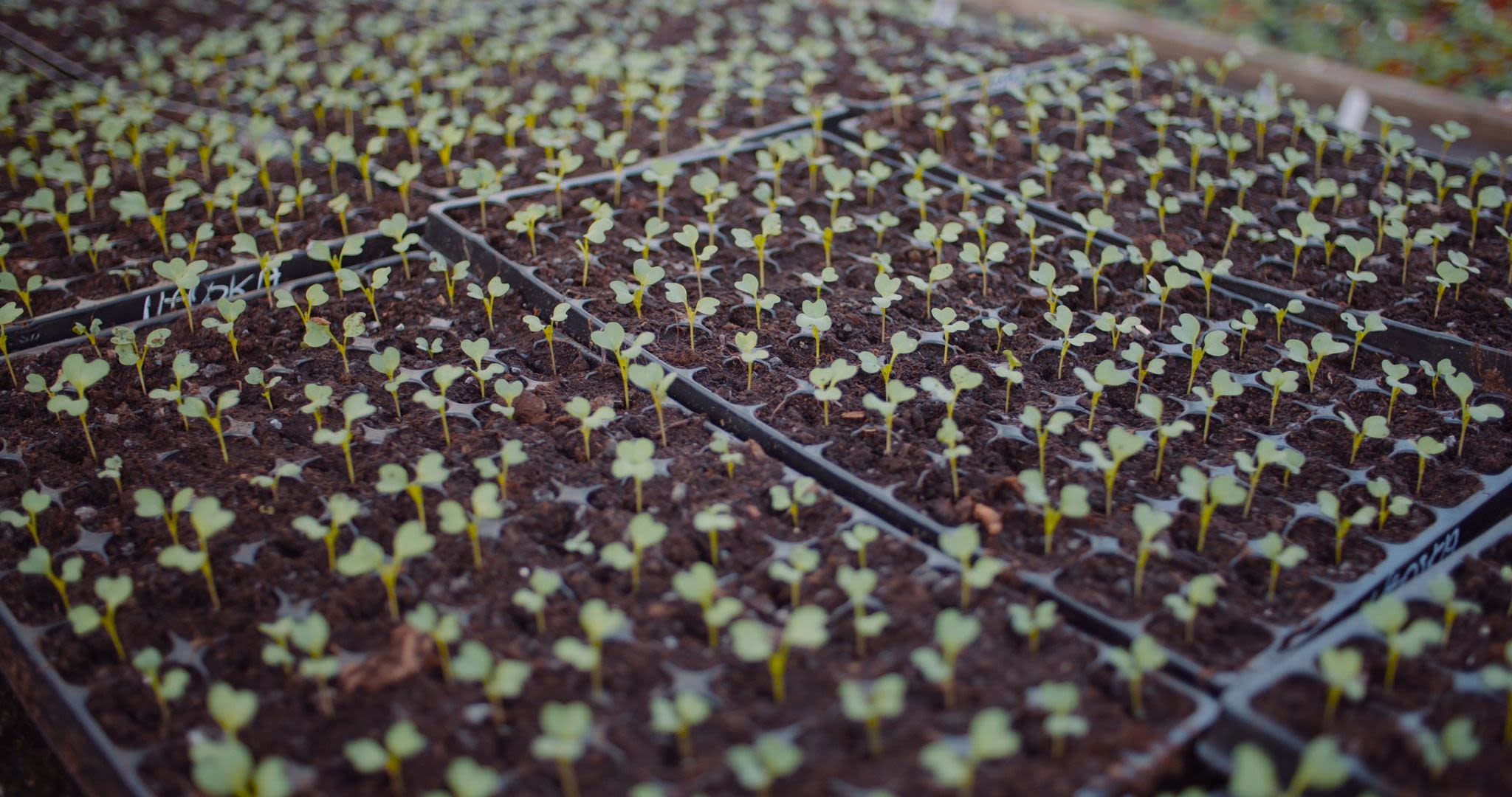
The NAP process not only enables countries to systematically manage the climate risks they face, but also to do so in a way that advances a range of other development priorities. This year, our team of researchers conducted deep dives on different themes to help governments use their NAP processes to address and elevate such priorities in building climate resilience.
- We reviewed 19 NAP documents to provide guidance on how to use the NAP process to scale up ecosystem-based adaptation measures when building resilience to climate change.
- We showed how integrating climate and disaster risk finance and insurance (CDRFI) solutions into NAP processes will enable governments, businesses, and individuals to strengthen financial resilience in the event of shocks and stresses caused by climate change.
- We provided recommendations on how countries can create opportunities for diverse stakeholders at all levels—from citizens and local organizations to sub-national and national policymakers—to collaborate in an inclusive NAP process.
- We examined how sexual and reproductive health and rights (SRHR) have been treated in NAP processes to date, finding that while governments are prioritizing adaptation in the health sector in their NAP processes, there has been limited attention to SRHR in overarching NAP documents so far.
Donors Committing Funding for a New Era of NAP Global Network Support

At the 2021 UN Climate Change Conference (COP 26), the NAP Global Network received new funding from Canada, the United States, Germany, Ireland, and the United Kingdom to increase support for national adaptation planning and action in developing countries. This announcement highlighted how much NAP processes are valued and recognized for their role in building a resilient future.
CANADA is providing up to CAD 10 million to enhance inclusion in the NAP process, making sure those most affected by the climate crisis—particularly women and marginalized groups—help shape their country’s adaptation priorities.
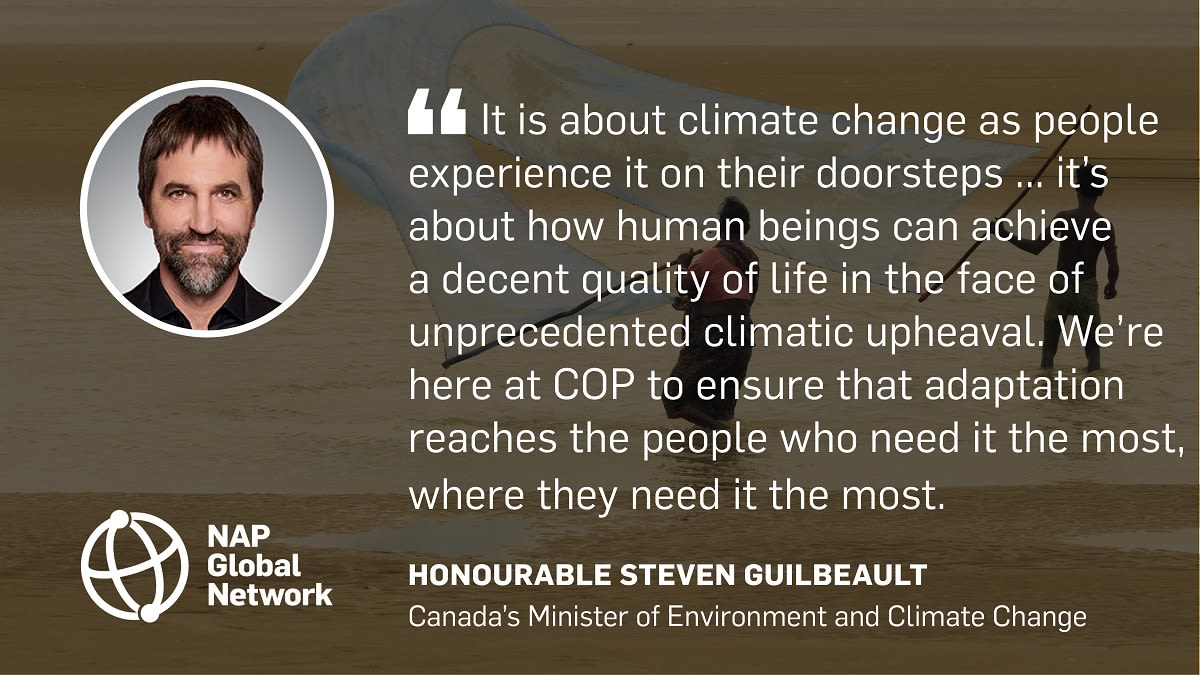
A quote from the Honourable Steven Guilbeault, Canada’s Minister of Environment and Climate Change, during Canada's funding announcement for the NAP Global Network at COP 26.
A quote from the Honourable Steven Guilbeault, Canada’s Minister of Environment and Climate Change, during Canada's funding announcement for the NAP Global Network at COP 26.
IRELAND is providing EUR 1 million to support the efforts of Small Island Developing States and least-developed countries in ensuring open communication about climate action, with a focus on monitoring progress.
Colm Brophy, Minister of State for Overseas Development and Diaspora, Ireland, announcing EUR 1 million in funding for the NAP Global Network at COP 26.
GERMANY committed EUR 2.5 million to support countries in tracking adaptation progress as part of the NAP process. Trevor Thompson, Ministry of Agriculture and Lands, Grenada, argues that the monitoring and evaluation system “should be number one in the NAP.”
Trevor Thompson, Ministry of Agriculture and Lands, Grenada.
THE UNITED KINGDOM committed GBP 1.2 million to help countries in preparing their ADCOMs and complete the formulation of their NAPs. Several countries undertook the ADCOM development process this year: for example, Namibia’s consultation team took this opportunity to go into fields and learn about the adaptation progress of farmers.
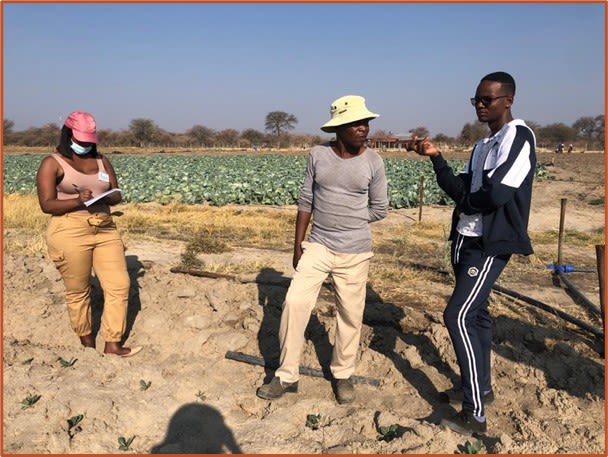
Namibia’s consultation team went out into the fields to learn about the adaptation progress of farmers (with Farm Manager Ticharunga).
Namibia’s consultation team went out into the fields to learn about the adaptation progress of farmers (with Farm Manager Ticharunga).
THE UNITED STATES is giving USD 1.19 million to help increase capacity building in least-developed and developing countries, track progress of adaptation efforts, and address emerging adaptation needs.
Jonathan Pershing, Deputy Special Envoy for Climate, U.S., referred to former US President Barack Obama’s call to increase resilience across all vulnerable countries while announcing new funding for the NAP Global Network at COP 26.
With this new funding and the momentum built in the past year, our team at the NAP Global Network Secretariat, hosted by the International Institute for Sustainable Development (IISD), is ready for the work ahead and excited to see real change as NAPs start being implemented around the world.
